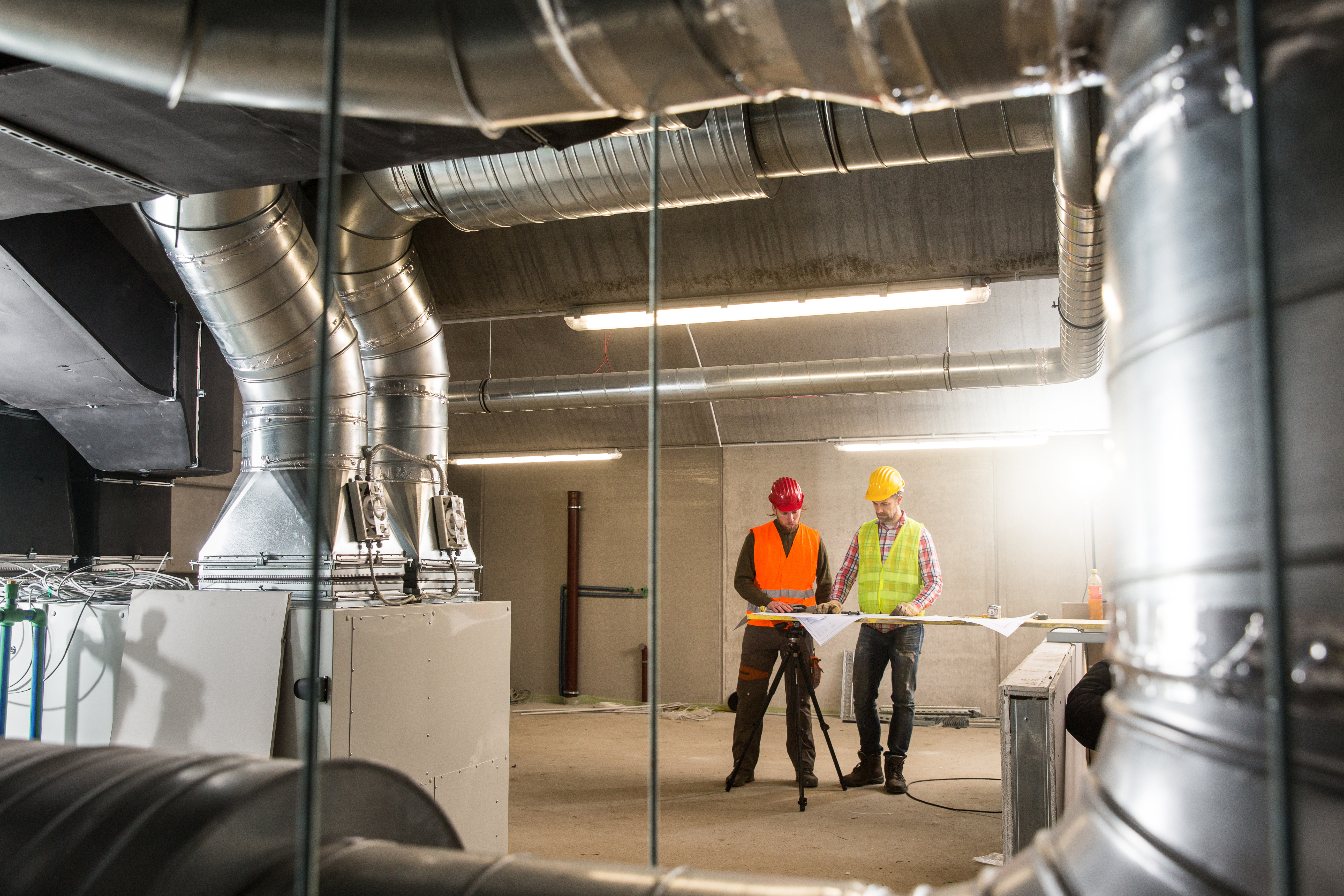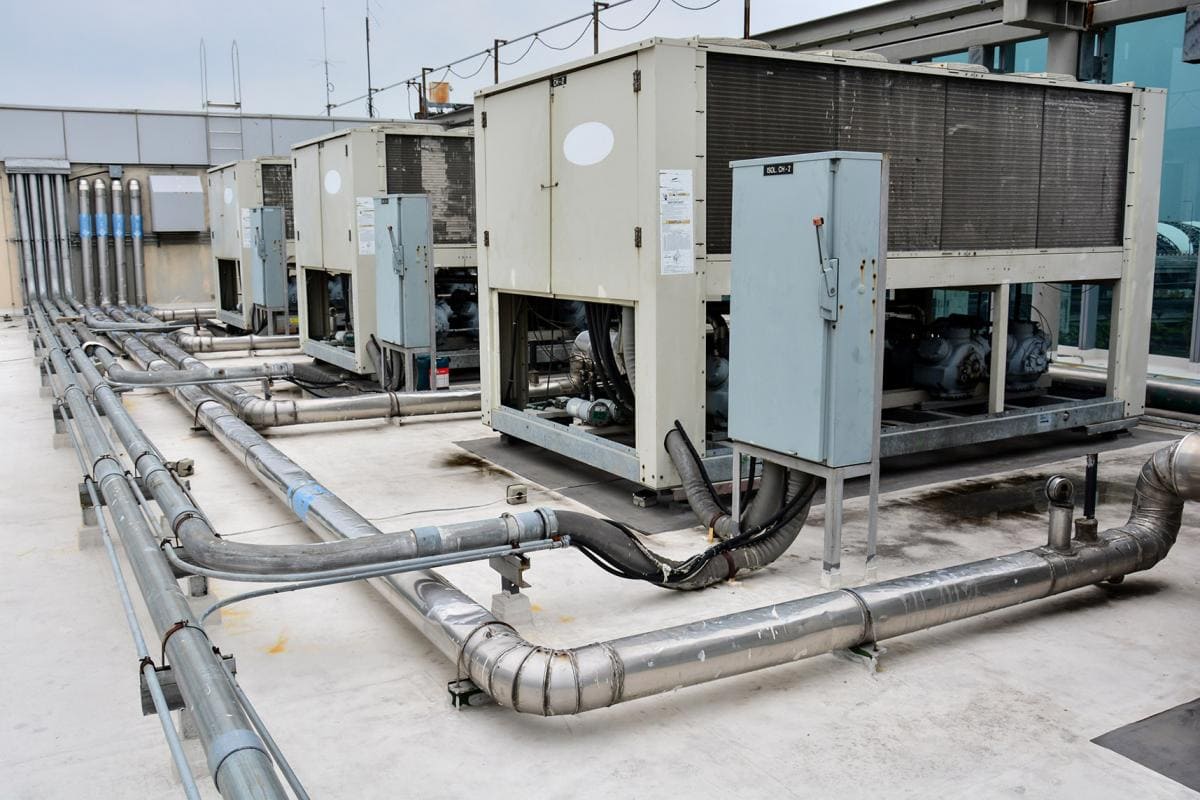Discovering the Essential Elements of an Effective A/c System
An effective a/c system is improved several critical elements that operate in consistency. Each part, from the thermostat to the ductwork, plays a necessary duty in preserving convenience and power performance. Comprehending these aspects is critical for optimizing performance and boosting indoor air quality. As one analyzes these elements, the complex relationships between them expose insights right into boosting total system performance. What certain elements add most to this effectiveness?
The Function of the Thermostat in Cooling And Heating Performance

Although usually overlooked, the thermostat plays a crucial function in the performance of HVAC systems. HVAC experts. This small device works as the primary nerve center, regulating temperature setups and making certain ideal comfort within a space. By properly picking up the ambient temperature level, the thermostat communicates with the home heating, air, and air flow conditioning systems to maintain the desired climate
An efficient thermostat reduces energy usage by triggering the HVAC system just when needed, thereby avoiding too much home heating or air conditioning. Modern smart and programmable thermostats improve this performance further by permitting customers to set timetables and remotely change settings, adapting to daily routines.
In addition, the placement of the thermostat is crucial; inappropriate area can result in inaccurate temperature level readings, resulting in ineffective operation. In general, a well-functioning thermostat not just boosts comfort but likewise adds markedly to energy financial savings and the longevity of the cooling and heating system.
Comprehending the Relevance of Air Filters
Air filters serve a vital feature in cooling and heating systems by guaranteeing that the air circulating within an area stays healthy and balanced and tidy. These filters catch dirt, irritants, and other contaminants, preventing them from being recirculated throughout the atmosphere. By recording these particles, air filters add to enhanced indoor air top quality, which can considerably benefit owners' wellness, particularly those with allergic reactions or respiratory conditions.
Furthermore, preserving tidy air filters boosts the effectiveness of cooling and heating systems. Blocked filters can restrict airflow, causing the system to function more challenging to maintain desired temperatures, resulting in boosted power intake and higher energy costs. Frequently replacing or cleansing filters is an essential upkeep step that can prolong the life-span of cooling and heating equipment. Eventually, comprehending the relevance of air filters permits home owners and structure supervisors to take positive measures to assure a well-functioning, effective HVAC system that advertises a risk-free and comfy indoor environment.

The Functionality of the Heater and Heatpump
Furnaces and heatpump are vital elements of a/c systems, accountable for offering heat throughout colder months. Furnaces operate by home heating air through combustion or electrical resistance, then distributing it throughout the home using ducts. They normally provide quick heating and can be sustained by gas, electrical energy, or oil, depending upon the system kind.
Conversely, heat pumps move warmth as opposed to generate it. They draw out warmth from the outdoors air or ground, even in reduced temperatures, and transfer it inside. HVAC experts. This twin functionality allows warmth pumps to likewise give air conditioning in warmer months, making them versatile options for year-round climate control
Both systems require correct maintenance to guarantee performance and longevity. While furnaces stand out in severe cool, warm pumps can be advantageous in moderate environments. Recognizing their distinct functionalities help home owners in selecting one of the most appropriate option for their heating needs.
Checking Out the Air Conditioning Device
The cooling unit is a crucial element of HVAC systems, available in different types to match different demands. Recognizing the effectiveness scores of these devices is crucial for making informed choices concerning energy usage and cost. This area will certainly discover the varied kinds of air conditioning unit and clear up just how efficiency ratings impact efficiency.
Kinds Of Air Conditioners
While different factors influence the choice of a/c systems, recognizing the various types offered is essential for house owners and structure supervisors alike. Central air conditioning conditioners are developed to cool down entire homes or structures, using a network of air ducts for air flow. Home window devices supply a more localized remedy, ideal for small spaces or solitary rooms. Portable ac unit supply adaptability, permitting users to relocate the unit as required. Ductless mini-split systems are an additional choice, combining the effectiveness of main systems with the benefit of zoning, as they require no ductwork. Geothermal systems harness the earth's temperature level for energy-efficient air conditioning. Each kind features distinctive advantages, making educated options important for efficient climate control.

Efficiency Ratings Clarified
Comprehending performance ratings is necessary for choosing the appropriate air conditioning device, as these metrics offer understanding right into the system's efficiency and power consumption. One of the most typical rating for a/c is the Seasonal Power Performance Ratio (SEER), which gauges the cooling result throughout a normal cooling period separated by the overall electrical energy input. A higher SEER shows better effectiveness. Additionally, the Power Efficiency Ratio (EER) is used for determining efficiency under specific problems. One more vital metric is the Energy Celebrity certification, which indicates that an unit fulfills rigorous power effectiveness standards. By evaluating these rankings, customers can make informed choices that not only optimize convenience however additionally decrease power prices and ecological influence.
The Importance of Ductwork and Air flow
Reliable ductwork design and air flow management play crucial duties in the overall effectiveness and performance of heating and cooling systems. Appropriate ductwork warranties that conditioned air is dispersed evenly throughout a space, decreasing temperature changes and boosting comfort. Properly designed air ducts minimize resistance to air flow, reducing the workload on cooling and heating equipment and eventually reducing energy usage.
Airflow administration entails purposefully putting vents and signs up to boost the flow of air. This avoids common problems such as warm or chilly areas, which can take place when airflow is blocked or improperly balanced. In addition, the right duct materials and insulation can further boost performance by minimizing heat loss or gain throughout air transit.
A reliable ductwork system not only adds to energy cost savings yet can also prolong the life-span of cooling and heating tools by lowering unneeded pressure (HVAC experts). Comprehending the value of ductwork and air movement is vital for accomplishing peak Cooling and heating system efficiency.
Routine Maintenance Practices to Improve Efficiency
Routine maintenance techniques are crucial for guaranteeing peak performance of cooling and heating systems. These practices include routine examinations, cleaning, and needed repair work to keep the system running successfully. Frequently altering air filters is important, as blocked filters can obstruct air flow and minimize efficiency. On top of that, specialists must inspect and clean evaporator and condenser coils to stop overheating and power wastage.
Annual specialist assessments are also recommended, as trained professionals can determine potential problems prior to they escalate. Lubing relocating parts minimizes wear and tear, adding to a longer life expectancy for the system. Moreover, guaranteeing that the thermostat functions correctly aids in maintaining optimal temperature control.

Frequently Asked Questions
How Frequently Should I Change My Thermostat?
Thermostats should commonly be changed every 5 to one decade, depending upon usage and modern technology advancements. Routine checks are a good idea to assure peak performance, especially if experiencing inconsistent temperature level control or increased power prices.
What Size Air Filter Is Ideal for My HVAC System?
The finest size air filter for an a/c system differs by system layout. Usually, it's essential to get in touch with the proprietor's guidebook or examine the existing filter dimensions to ensure peak performance and air quality.
Can I Set Up a Heatpump Myself?
Mounting a warm pump independently is feasible for knowledgeable people, but it needs expertise of electric systems and regional codes. Working with a professional is recommended to assure correct setup and suitable system efficiency.
Exactly how Do I Know if My Ductwork Is Effective?
To figure out ductwork effectiveness, one should inspect for leaks, measure air flow at vents, inspect insulation high quality, and assess temperature distinctions in between supply and return ducts. Expert evaluations can offer extensive understandings into general efficiency.
What Are Signs My Cooling And Heating Demands Immediate Maintenance?
Indicators that a cooling and heating system needs prompt maintenance include unusual noises, inconsistent temperatures, enhanced energy bills, unpleasant odors, and regular biking. Addressing these concerns quickly can prevent more damage and assurance top system performance.
Air filters serve a crucial function in HVAC systems by ensuring that the air flowing within a space remains tidy and healthy. Furthermore, maintaining clean air filters improves the effectiveness of A/c systems. Ductless mini-split systems are another choice, incorporating the effectiveness of central systems with the more info comfort of zoning, as they need no ductwork. Recognizing efficiency scores is necessary for selecting the best air conditioning unit, as these metrics provide understanding right into the system's performance and energy consumption. The best dimension air filter for a HVAC system varies by unit style.